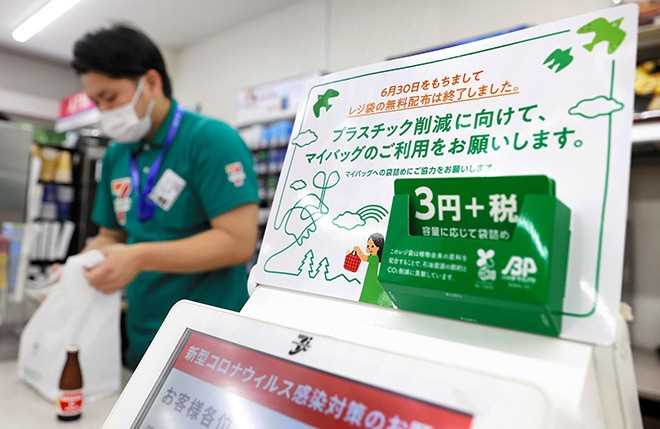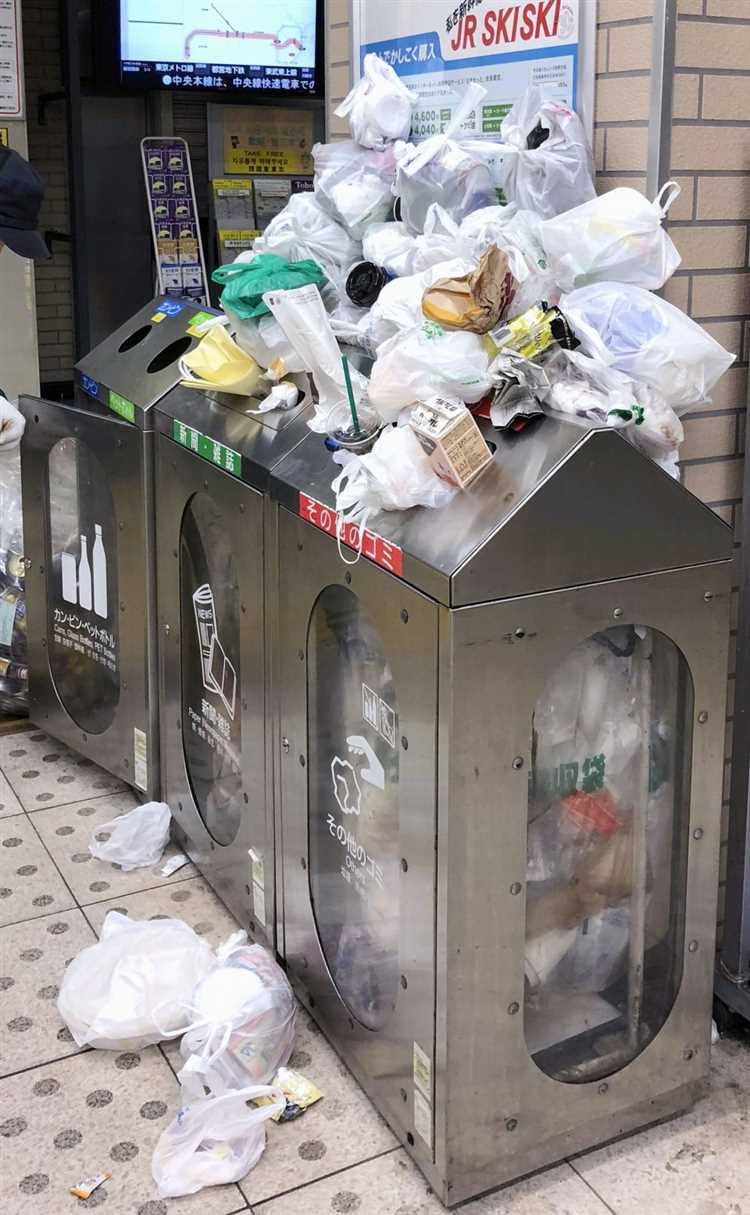
In recent years, the world has become increasingly aware of the negative impact of plastic on the environment. Governments and individuals alike have taken steps to reduce plastic waste and find more sustainable alternatives. Japan, known for its technological advancements and innovative solutions, has also been actively addressing this issue.
Plastic bags have long been a part of Japan’s shopping culture. Known as “katakana”, these bags have been widely used by both retailers and consumers for their convenience and durability. However, in response to the global call for more eco-friendly practices, Japan has been taking significant measures to reduce the use of plastic bags.
In 2020, Japan enacted a law that required large retailers to charge customers for plastic bags. This move aimed to encourage consumers to bring their own reusable bags and reduce their reliance on single-use plastics. The law also mandated that retailers label the price of the bags on receipts, making consumers more aware of the environmental and financial costs associated with plastic bags.
Furthermore, many local governments in Japan have implemented their own initiatives to combat plastic waste. Some regions have banned the use of plastic bags entirely, while others have set recycling goals and encouraged the use of biodegradable alternatives. Additionally, supermarkets and convenience stores across the country have introduced biodegradable or paper bags as options for customers.
While Japan still uses plastic bags to some extent, the country has made significant progress in reducing their usage and promoting more sustainable practices. The government’s efforts, combined with a growing awareness among the Japanese population, have paved the way for a more eco-friendly future.
- The Current Situation with Plastic Bags in Japan
- The Environmental Impact of Plastic Bags
- The Problem with Plastic Bags
- Solutions and Initiatives
- The History of Plastic Bag Usage in Japan
- Japan’s Efforts to Reduce Plastic Waste
- Alternatives to Plastic Bags in Japan
- 1. Reusable Shopping Bags
- 2. Paper Bags
- The Role of Businesses and Government in Plastic Bag Reduction
- Public Awareness and Education about Plastic Bag Usage in Japan
- Government Initiatives
- Local Government Efforts
- Question-answer:
- Is the use of plastic bags still common in Japan?
- Are there any regulations or initiatives in place to reduce plastic bag usage in Japan?
- Have Japanese consumers been receptive to the efforts to reduce plastic bag usage?
- Do all stores in Japan charge for plastic bags?
- What alternatives to plastic bags are being promoted in Japan?
- Does Japan still use plastic bags?
The Current Situation with Plastic Bags in Japan
Plastic bags have been a prominent issue in Japan for several years now. In an effort to reduce plastic waste and promote sustainability, the Japanese government and local municipalities have implemented various regulations and initiatives.
One of the most significant actions taken was the introduction of a plastic bag fee in 2020. Retailers are required to charge customers a small fee for each plastic bag used, encouraging people to bring their own reusable bags. This measure has been successful in reducing the number of plastic bags distributed and promoting a shift towards more eco-friendly alternatives.
In addition to the plastic bag fee, many stores have also started offering eco-friendly alternatives such as biodegradable or reusable bags. Some supermarkets even provide incentives for customers who bring their own bags, such as discounts or loyalty points.
Furthermore, municipalities across Japan have introduced recycling programs specifically targeting plastic bags. Residents are often required to separate their recyclable waste, including plastic bags, from general trash. These efforts aim to divert plastic waste from landfills and promote recycling.
Despite these efforts, it is worth noting that plastic bags are still readily available in certain situations, such as in some convenience stores or for specific products like fresh produce. However, the overall use of plastic bags has significantly decreased, and there is a growing awareness among Japanese citizens about the importance of reducing plastic waste.
Looking ahead, Japan aims to further tackle the issue of plastic waste by implementing stricter regulations and promoting innovative solutions. This includes exploring more sustainable packaging options and encouraging businesses and consumers to embrace a zero-waste mindset.
In conclusion, while plastic bags are still used to some extent in Japan, there have been significant strides made in reducing their usage. The introduction of a plastic bag fee, the availability of eco-friendly alternatives, and recycling initiatives are all contributing to a more sustainable future in Japan.
The Environmental Impact of Plastic Bags
Plastic bags have become a significant environmental concern worldwide due to their extensive use and long-lasting effects on the environment. Japan, like many other countries, is grappling with the negative impacts of plastic bags and taking steps to address this issue.
The Problem with Plastic Bags
Plastic bags are made from non-renewable resources, primarily fossil fuels. The production process of plastic bags contributes to greenhouse gas emissions and depletes natural resources. Furthermore, plastic bags are not biodegradable, meaning they do not break down naturally over time. Instead, they accumulate in landfills, oceans, and other natural environments, causing widespread pollution.
Plastic bags pose a significant threat to wildlife. Many animals mistake plastic bags for food, ingesting them and suffering from severe health issues or even death. Additionally, plastic bags can entangle marine animals, such as sea turtles and seabirds, leading to injuries and fatalities.
Solutions and Initiatives
Recognizing the urgency of the plastic bag problem, Japan has implemented various initiatives to reduce their consumption and minimize their environmental impact. One notable effort is the introduction of the “3R” policy – Reduce, Reuse, and Recycle. This policy aims to promote a more sustainable approach to waste management.
The Japanese government has also encouraged the use of eco-friendly alternatives to plastic bags. Many stores now offer reusable bags made from natural materials, such as cloth or biodegradable materials. Additionally, there has been a push for consumers to bring their bags when shopping, reducing the need for single-use plastic bags.
Furthermore, efforts are being made to raise awareness among the public about the environmental consequences of plastic bags. Educational campaigns on the importance of reducing plastic bag usage and proper disposal have been launched to encourage behavioral changes and promote more environmentally friendly practices.
In conclusion, plastic bags have a significant environmental impact that goes beyond their convenience. Japan, along with other countries, is actively working towards reducing plastic bag usage and adopting more sustainable alternatives. By implementing policies, promoting eco-friendly alternatives, and raising awareness, Japan is taking important steps towards minimizing the negative effects of plastic bags on the environment.
The History of Plastic Bag Usage in Japan
Plastic bags have been a significant part of daily life in Japan for many years. The utilization of plastic bags began to gain popularity in the country during the economic boom of the 1960s. As Japan experienced rapid industrialization and urbanization, the demand for convenient packaging solutions grew.
Before plastic bags became widely used, the Japanese relied on traditional wrapping materials such as cloth and paper. However, these materials were not as durable or water-resistant as plastic, making plastic bags a more practical option.
In the 1970s, Japan faced an environmental crisis when the negative effects of plastic pollution became apparent. The government and the public became increasingly aware of the environmental impact and started taking measures to address the issue.
As a result, Japan became one of the first countries to introduce a plastic bag recycling system. Retailers were encouraged to collect used bags for recycling, and consumers were educated about the importance of recycling and reducing plastic waste.
In recent years, Japan has made even more significant efforts to reduce plastic bag usage. In 2020, the government implemented a new legislation known as the “Plastic Bags Reduction Act.” This act aims to reduce the consumption of single-use plastic bags by promoting reusable alternatives and imposing a fee for plastic bags provided by retailers.
Today, many Japanese retailers offer eco-friendly alternatives such as cloth bags and paper bags. Consumers are encouraged to bring their own reusable bags when shopping, reducing the need for plastic bags.
| Year | Milestone |
|---|---|
| 1960s | Plastic bags gain popularity during economic boom |
| 1970s | Japan introduces a plastic bag recycling system |
| 2020 | The “Plastic Bags Reduction Act” is implemented |
Overall, the history of plastic bag usage in Japan reflects the country’s journey towards sustainability and environmental consciousness. While plastic bags were once an integral part of daily life, the government and the public have worked together to reduce their usage and promote eco-friendly alternatives.
Japan’s Efforts to Reduce Plastic Waste

Japan has been taking significant steps to combat the issue of plastic waste and reduce its environmental impact. The country has long been known for its efficient waste management system and strict recycling policies.
One of the key initiatives in Japan’s efforts to reduce plastic waste is the promotion of reusable bags. Many supermarkets and retail stores encourage customers to bring their own bags or purchase eco-friendly alternatives. This has significantly reduced the use of single-use plastic bags, promoting a more sustainable approach to shopping.
In addition to promoting reusable bags, Japan has also implemented various regulations and initiatives to reduce plastic waste. For instance, there are strict laws in place regarding the disposal of plastic bottles. These regulations require businesses and individuals to separate plastic bottles for recycling, ensuring that they are properly processed and reused.
Furthermore, the Japanese government has been actively supporting research and development of alternative materials to replace single-use plastics. This includes promoting the use of biodegradable materials and exploring innovative solutions such as edible packaging.
Education and awareness campaigns have also played a significant role in the country’s efforts to reduce plastic waste. From an early age, Japanese citizens are educated about the importance of recycling and reducing waste. Schools and local communities organize events and initiatives to raise awareness about the environmental impact of plastic waste, encouraging individuals to adopt more sustainable habits.
Overall, Japan is actively working towards achieving a more sustainable and environmentally friendly society. Through the promotion of reusable bags, implementation of strict regulations, and support for alternative materials, the country is making great strides in reducing plastic waste and setting an example for the rest of the world.
Alternatives to Plastic Bags in Japan
Japan has been working towards reducing its plastic waste, and this includes finding alternatives to single-use plastic bags. The government and businesses are encouraging the use of more sustainable options, and several alternatives have gained popularity in recent years.
1. Reusable Shopping Bags

One of the most common alternatives to plastic bags in Japan is reusable shopping bags. These bags are made from durable materials such as cloth or canvas and can be used multiple times. Many supermarkets and stores offer these bags for purchase or give them out as promotional items.
2. Paper Bags
Paper bags are another alternative to plastic bags that are gaining popularity in Japan. These bags are biodegradable and can be recycled, making them a more environmentally friendly option. Some stores charge a small fee for paper bags to encourage customers to bring their own reusable bags.
| Pros | Cons |
|---|---|
| – Reusable | – Can tear easily |
| – Can hold heavy items | – Not water-resistant |
| – Biodegradable and recyclable | – Takes up more space |
Overall, paper bags are a good alternative to plastic bags, but they have their drawbacks. It is important to consider their limitations and use them responsibly.
The Role of Businesses and Government in Plastic Bag Reduction
Plastic bag reduction is a pressing issue that requires collaborative efforts from both businesses and government entities in Japan. Both have a crucial role to play in raising awareness, implementing regulations, and promoting sustainable alternatives.
Businesses in Japan have a responsibility to reduce their reliance on plastic bags and adopt environmentally friendly practices. By implementing policies that encourage customers to bring their own bags or provide reusable options, businesses can help in reducing the demand for single-use plastic bags. Moreover, they can also educate their customers about the environmental impact of plastic bags and promote sustainable alternatives such as biodegradable or compostable bags.
Government regulations also play a key role in reducing plastic bag usage. In recent years, Japan has taken steps to address this issue by implementing policies and regulations aimed at reducing plastic waste. For example, some cities have introduced ordinances that require businesses to charge for plastic bags or even ban their distribution altogether. These regulations serve as a deterrent and encourage both businesses and consumers to seek alternative solutions.
The government can also play a crucial role in promoting sustainable practices by providing incentives for businesses to adopt environmentally friendly packaging options. This could include tax breaks or subsidies for businesses that invest in sustainable packaging materials or technologies. By incentivizing businesses, the government can accelerate the shift towards more sustainable practices and help reduce plastic bag usage.
Additionally, the government can allocate resources towards public awareness campaigns and educational programs that emphasize the importance of reducing plastic bag usage. By partnering with businesses, NGOs, and local communities, the government can effectively communicate the environmental impact of plastic bags and promote sustainable alternatives.
Overall, reducing plastic bag usage in Japan requires the combined efforts of businesses and government entities. Through collaborative initiatives, policies, and regulations, both can support the transition towards more sustainable practices, contributing to a cleaner and healthier environment.
Public Awareness and Education about Plastic Bag Usage in Japan
Plastic pollution is a significant global issue that affects both the environment and human health. In recent years, Japan has made significant efforts to address this problem, particularly in reducing the use of single-use plastic bags.
Government Initiatives
The Japanese government has implemented various initiatives to raise public awareness and educate the population about the negative impacts of plastic bag usage. One such initiative is the establishment of the Resource Circulation Strategy promoted by the Ministry of the Environment. This strategy aims to reduce plastic waste and increase recycling rates.
As part of this strategy, the government has implemented a plastic bag charge called the “my bag” campaign. Under this campaign, consumers are encouraged to bring their own reusable bags when shopping. Retailers are also encouraged to provide incentives for customers who bring their own bags or choose not to use plastic bags.
Local Government Efforts
In addition to the national government’s initiatives, many local governments in Japan have taken independent action to reduce plastic bag usage. Some municipalities have implemented plastic bag bans, prohibiting retailers from providing single-use plastic bags to customers. Others have introduced programs to promote the use of eco-friendly alternatives, such as biodegradable bags.
Local governments have also been proactive in educating their citizens about the importance of reducing plastic bag usage. They have organized various awareness campaigns, public lectures, and workshops to promote environmentally friendly practices and inform the public about the harmful effects of plastic pollution.
| Year | Plastic Bag Usage |
|---|---|
| 2015 | 25 billion bags |
| 2020 | 7 billion bags |
The table above demonstrates the significant reduction in plastic bag usage in Japan over the past few years, indicating the effectiveness of these awareness and education initiatives.
Overall, public awareness and education play a crucial role in reducing plastic bag usage in Japan. The government’s initiatives and local government efforts have contributed to a significant decrease in plastic bag consumption. However, continuous efforts are needed to further reduce plastic pollution and promote sustainable practices.
Question-answer:
Is the use of plastic bags still common in Japan?
Yes, the use of plastic bags is still common in Japan, although there has been a recent push to reduce their consumption.
Are there any regulations or initiatives in place to reduce plastic bag usage in Japan?
Yes, Japan has implemented various regulations and initiatives to reduce plastic bag usage, such as charging for plastic bags at stores and promoting the use of reusable shopping bags.
Have Japanese consumers been receptive to the efforts to reduce plastic bag usage?
Yes, Japanese consumers have generally been receptive to the efforts to reduce plastic bag usage. Many people bring their own reusable bags when shopping and are willing to pay for plastic bags if necessary.
Do all stores in Japan charge for plastic bags?
No, not all stores in Japan charge for plastic bags. However, it has become more common for stores to charge for bags, especially larger retailers and supermarkets.
What alternatives to plastic bags are being promoted in Japan?
In addition to promoting the use of reusable shopping bags, Japan is also encouraging the use of paper bags and biodegradable bags as alternatives to plastic bags.
Does Japan still use plastic bags?
Yes, Japan is still using plastic bags, but there have been efforts to reduce their usage.